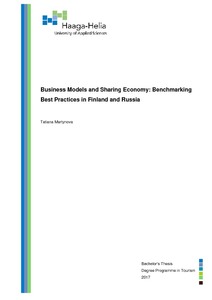Business Models and Sharing Economy: Benchmarking Best Practices in Finland and Russia
Martynova, Tatiana (2017)
Martynova, Tatiana
Haaga-Helia ammattikorkeakoulu
2017
All rights reserved
Julkaisun pysyvä osoite on
https://urn.fi/URN:NBN:fi:amk-2017052710604
https://urn.fi/URN:NBN:fi:amk-2017052710604
Tiivistelmä
The thesis studies the best practices in sharing economy across various industries in Russia and Finland, based on case studies of business models. It researches current legal status of the phenomenon as well as legislative changes that are to be expected in the field of sharing economy.
The thesis project was commissioned in November 2015 by Association of Finnish Travel Agents (AFTA), an organization formed by travel agents, tour operators and incoming agents to promote the mutual interests of its members and protect their rights. Research data were collected through mixed method approach, in particular desktop research, literature review, industry reports carefully selected to serve the purpose of the thesis.
The purpose of the thesis is to identify and analyse sharing economy as a fundamentally new and disruptive type of business models. In addition it assesses the strength of various business models behind sharing economy and benchmarks best practices existing in Finland and Russia. The needs of travel and tourism industry towards new-coming business model are explored in the thesis as are concrete suggestions on how to provide services aligned with those needs.
Firstly, the thesis introduces the commissioning party and its field as well as the concept of collaborative consumption with the help of the most relevant literature. The notions of collaborative economy, sharing economy, peer economy and collaborative consumption are distinguished and explained as part of conceptual research. In addition, thesis examines if there are already business opportunities behind the sharing economy and outlines the current legislative state of peer-to-peer companies.
Secondly, the thesis studies the current state of sharing economy in Finland and Russia, based on case studies of successful national examples of peer-to-peer platforms. It also provides the analysis of best practices worldwide and discusses the competitive advantages and possible obstacles to sharing economy development.
Finally, suggestions on how to learn from sharing economy and how to apply the lessons from sharing economy in developing the business of intermediaries in travel and tourism industry are outlined.
The thesis project was commissioned in November 2015 by Association of Finnish Travel Agents (AFTA), an organization formed by travel agents, tour operators and incoming agents to promote the mutual interests of its members and protect their rights. Research data were collected through mixed method approach, in particular desktop research, literature review, industry reports carefully selected to serve the purpose of the thesis.
The purpose of the thesis is to identify and analyse sharing economy as a fundamentally new and disruptive type of business models. In addition it assesses the strength of various business models behind sharing economy and benchmarks best practices existing in Finland and Russia. The needs of travel and tourism industry towards new-coming business model are explored in the thesis as are concrete suggestions on how to provide services aligned with those needs.
Firstly, the thesis introduces the commissioning party and its field as well as the concept of collaborative consumption with the help of the most relevant literature. The notions of collaborative economy, sharing economy, peer economy and collaborative consumption are distinguished and explained as part of conceptual research. In addition, thesis examines if there are already business opportunities behind the sharing economy and outlines the current legislative state of peer-to-peer companies.
Secondly, the thesis studies the current state of sharing economy in Finland and Russia, based on case studies of successful national examples of peer-to-peer platforms. It also provides the analysis of best practices worldwide and discusses the competitive advantages and possible obstacles to sharing economy development.
Finally, suggestions on how to learn from sharing economy and how to apply the lessons from sharing economy in developing the business of intermediaries in travel and tourism industry are outlined.
